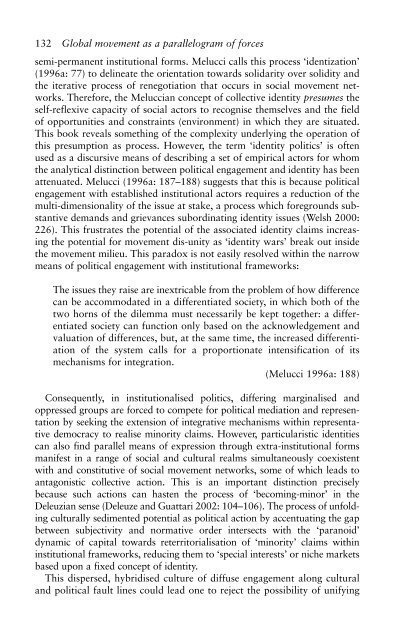Complexity and Social Movements: Multitudes at the Edge of Chaos ...
Complexity and Social Movements: Multitudes at the Edge of Chaos ...
Complexity and Social Movements: Multitudes at the Edge of Chaos ...
Create successful ePaper yourself
Turn your PDF publications into a flip-book with our unique Google optimized e-Paper software.
132 Global movement as a parallelogram <strong>of</strong> forces<br />
semi-permanent institutional forms. Melucci calls this process ‘identiz<strong>at</strong>ion’<br />
(1996a: 77) to deline<strong>at</strong>e <strong>the</strong> orient<strong>at</strong>ion towards solidarity over solidity <strong>and</strong><br />
<strong>the</strong> iter<strong>at</strong>ive process <strong>of</strong> renegoti<strong>at</strong>ion th<strong>at</strong> occurs in social movement networks.<br />
Therefore, <strong>the</strong> Meluccian concept <strong>of</strong> collective identity presumes <strong>the</strong><br />
self-reflexive capacity <strong>of</strong> social actors to recognise <strong>the</strong>mselves <strong>and</strong> <strong>the</strong> field<br />
<strong>of</strong> opportunities <strong>and</strong> constraints (environment) in which <strong>the</strong>y are situ<strong>at</strong>ed.<br />
This book reveals something <strong>of</strong> <strong>the</strong> complexity underlying <strong>the</strong> oper<strong>at</strong>ion <strong>of</strong><br />
this presumption as process. However, <strong>the</strong> term ‘identity politics’ is <strong>of</strong>ten<br />
used as a discursive means <strong>of</strong> describing a set <strong>of</strong> empirical actors for whom<br />
<strong>the</strong> analytical distinction between political engagement <strong>and</strong> identity has been<br />
<strong>at</strong>tenu<strong>at</strong>ed. Melucci (1996a: 187–188) suggests th<strong>at</strong> this is because political<br />
engagement with established institutional actors requires a reduction <strong>of</strong> <strong>the</strong><br />
multi-dimensionality <strong>of</strong> <strong>the</strong> issue <strong>at</strong> stake, a process which foregrounds substantive<br />
dem<strong>and</strong>s <strong>and</strong> grievances subordin<strong>at</strong>ing identity issues (Welsh 2000:<br />
226). This frustr<strong>at</strong>es <strong>the</strong> potential <strong>of</strong> <strong>the</strong> associ<strong>at</strong>ed identity claims increasing<br />
<strong>the</strong> potential for movement dis-unity as ‘identity wars’ break out inside<br />
<strong>the</strong> movement milieu. This paradox is not easily resolved within <strong>the</strong> narrow<br />
means <strong>of</strong> political engagement with institutional frameworks:<br />
The issues <strong>the</strong>y raise are inextricable from <strong>the</strong> problem <strong>of</strong> how difference<br />
can be accommod<strong>at</strong>ed in a differenti<strong>at</strong>ed society, in which both <strong>of</strong> <strong>the</strong><br />
two horns <strong>of</strong> <strong>the</strong> dilemma must necessarily be kept toge<strong>the</strong>r: a differenti<strong>at</strong>ed<br />
society can function only based on <strong>the</strong> acknowledgement <strong>and</strong><br />
valu<strong>at</strong>ion <strong>of</strong> differences, but, <strong>at</strong> <strong>the</strong> same time, <strong>the</strong> increased differenti<strong>at</strong>ion<br />
<strong>of</strong> <strong>the</strong> system calls for a proportion<strong>at</strong>e intensific<strong>at</strong>ion <strong>of</strong> its<br />
mechanisms for integr<strong>at</strong>ion.<br />
(Melucci 1996a: 188)<br />
Consequently, in institutionalised politics, differing marginalised <strong>and</strong><br />
oppressed groups are forced to compete for political medi<strong>at</strong>ion <strong>and</strong> represent<strong>at</strong>ion<br />
by seeking <strong>the</strong> extension <strong>of</strong> integr<strong>at</strong>ive mechanisms within represent<strong>at</strong>ive<br />
democracy to realise minority claims. However, particularistic identities<br />
can also find parallel means <strong>of</strong> expression through extra-institutional forms<br />
manifest in a range <strong>of</strong> social <strong>and</strong> cultural realms simultaneously coexistent<br />
with <strong>and</strong> constitutive <strong>of</strong> social movement networks, some <strong>of</strong> which leads to<br />
antagonistic collective action. This is an important distinction precisely<br />
because such actions can hasten <strong>the</strong> process <strong>of</strong> ‘becoming-minor’ in <strong>the</strong><br />
Deleuzian sense (Deleuze <strong>and</strong> Gu<strong>at</strong>tari 2002: 104–106). The process <strong>of</strong> unfolding<br />
culturally sedimented potential as political action by accentu<strong>at</strong>ing <strong>the</strong> gap<br />
between subjectivity <strong>and</strong> norm<strong>at</strong>ive order intersects with <strong>the</strong> ‘paranoid’<br />
dynamic <strong>of</strong> capital towards reterritorialis<strong>at</strong>ion <strong>of</strong> ‘minority’ claims within<br />
institutional frameworks, reducing <strong>the</strong>m to ‘special interests’ or niche markets<br />
based upon a fixed concept <strong>of</strong> identity.<br />
This dispersed, hybridised culture <strong>of</strong> diffuse engagement along cultural<br />
<strong>and</strong> political fault lines could lead one to reject <strong>the</strong> possibility <strong>of</strong> unifying




